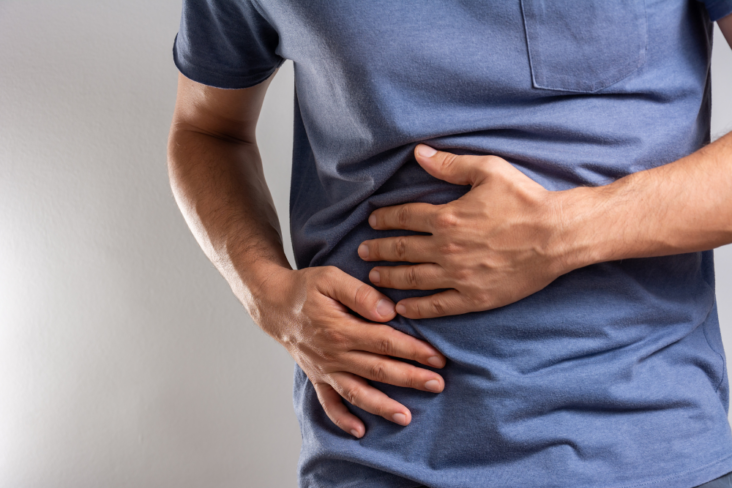Abdominal bloating is a condition that occurs when the gastrointestinal tract is filled with air, gas, faecal matter, or fluid.
Bloating is characterised by the feeling of fullness and distended stomach, and often leads to discomfort. This may be a result of overeating, consumption of high-fat food, and stress.
Bloating and discomfort, however, could also be a sign of an underlying medical condition in your digestive system.
Causes of lower abdominal bloating
To understand abdominal bloating, its effect, prevention methods, and treatment, it is important to first know the medical conditions that may cause it.
Constipation
Constipation refers to the difficulty in passing stools and infrequent bowel movements. As a result, stools remain in the intestine longer, causing bacteria to release more gas. When the stomach is filled with gas, it leads to bloating.
Poor dietary practices such as low fibre intake, low water intake, and smoking are some of the main causes of constipation.
Food intolerances
Food intolerances such as lactose or glucose intolerance are undesirable reactions to a certain type of food. For example, lactose intolerance is defined as the inability to digest lactose, which is the sugar present in dairy products. This sometimes causes discomfort and a full and tightened stomach.
Bloating due to intolerances is mostly mild and will subside. It may become more serious if it is accompanied by symptoms like diarrhoea and abdominal pain.
Small intestinal bacterial overgrowth (SIBO)
Our stomach and intestine are hosts to a variety of bacteria that help us in digesting food.
Small intestinal bacterial overgrowth or SIBO is a condition where the balance of bacteria is disturbed, resulting in an overgrowth of bacteria in the intestine.
In addition to lower abdominal bloating, the increase of harmful bacteria in the stomach may lead to other symptoms such as diarrhoea and pain.
Stomach infections
Infections in the stomach are caused by bacteria like E. coli or H. pylori and viruses such as norovirus and rotavirus.
These infections may lead to a bloated stomach accompanied by other symptoms such as abdominal pain, diarrhoea, vomiting, and nausea.
Indigestion
Indigestion can also lead to discomfort and lower abdominal bloating. The most common causes of indigestion are overeating, excessive alcohol consumption, and excessive intake of medications that cause stomach irritation.
Although indigestion is often brief and displays mild symptoms, frequent or chronic indigestion may be a sign of a more severe condition such as stomach ulcers, liver failure, or cancer.
Gastroparesis
Gastroparesis refers to the failure of stomach muscles to work properly, causing food to pass more slowly through the gastrointestinal tract.
Apart from the feeling of discomfort that comes with a tightened stomach, this condition may also show symptoms like nausea and vomiting, pain, and heartburn.
How can you prevent bloating in the abdomen?
Lower abdominal bloating due to mild conditions like indigestion may be avoided with a healthy diet, increasing your water and fibre intake, quitting smoking, limiting alcohol intake, and avoiding the trigger foods that can lead to intolerances.
Taking these steps can prevent the feeling of a full and tightened stomach.
See a gastroenterologist if symptoms persist or are severe
A visit to a specialist is warranted if bloating is followed by symptoms like:
- Sharp pain
- Fever
- Bloody stools
- Unexplained weight loss
- Severe nausea and vomiting
Healthy dietary practices and over-the-counter medication may work for mild pain and bloating, but it is dangerous to dismiss severe symptoms. A specialist will provide medical diagnosis and targeted treatment to help you address the underlying causes of bloating.

